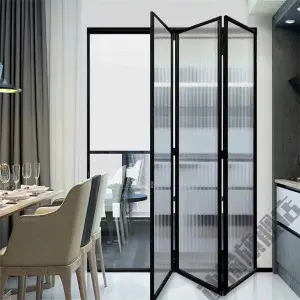Why are folding doors so expensive?
Folding doors are a popular choice for many homeowners and businesses due to their space-saving design and versatility. These doors are renowned for their ability to seamlessly connect indoor and outdoor spaces, making them ideal for modern living and commercial environments. However, a common question that arises when considering bifold doors is: “Why are bifold doors so expensive?” In this article, we will explore the factors that influence the cost of bifold doors and understand why they are considered a worthwhile investment.
Material quality and durability
One of the main reasons why bifold doors cost more is the quality of the materials used in their construction. High-quality folding doors are typically made from durable materials such as aluminum, steel, or wood and are designed to withstand harsh environments and provide long-term performance. These materials are typically more expensive to source and manufacture, adding to the overall cost of the door.
In addition to the material itself, the engineering and craftsmanship used to manufacture bifold doors also play a significant role in their cost. Precision engineering and attention to detail are crucial to ensuring the smooth and safe operation of folding doors, which requires skilled labor and specialized manufacturing processes.
Energy efficiency and insulation
Another factor that affects the cost of bifold doors is their energy efficiency and insulation properties. Many modern folding doors are designed to meet strict energy efficiency standards, helping to minimize heat loss and reduce energy consumption. This often involves the use of advanced insulation materials and technologies, such as insulation and low-e glass, which can increase the overall cost of the door.
Investing in energy-efficient folding doors can provide long-term savings on heating and cooling bills, making it a more sustainable and economical choice in the long run. Additionally, the enhanced insulation provided by high-quality folding doors helps create a more comfortable indoor environment, further justifying their higher initial cost.
Customization and design options
Folding doors often come in a variety of customization and design options, allowing customers to customize the door to their specific needs and aesthetic preferences. Customization options may include different finishes, hardware choices, and size changes, all of which can affect the overall cost of the door.
Additionally, the design and engineering of folding doors to accommodate large openings or unique architectural requirements may also contribute to their higher price. Custom solutions often require additional time and resources to develop, resulting in a higher cost for the final product.
Installation and maintenance precautions
The installation of a folding door is a key factor that affects its overall cost. Proper installation is essential to ensure the door operates properly and provides the expected level of performance and safety. Professional installation services, including the labor and expertise required, are factored into the total cost of bifold doors.
Additionally, ongoing maintenance and support for folding doors can also impact their overall cost. High-quality folding doors are durable and low-maintenance, but may require regular inspections and adjustments to ensure their continued functionality. Reliable customer support and the availability of warranty coverage also help increase the door’s perceived value, thus affecting its initial cost.
Perceived value and market demand
Market demand for folding doors also plays a role in their pricing. As the popularity of folding doors continues to grow, manufacturers and suppliers may adjust their pricing to reflect the perceived value of these in-demand products. The convenience, aesthetics and functional advantages of folding doors increase their popularity, thereby influencing their market pricing.
Additionally, the reputation and brand recognition of the manufacturer or supplier can affect the cost of folding doors. Established companies with a track record of delivering high-quality products and excellent customer service may command higher prices for their folding doors based on their reputation and perceived market value.
In summary, the cost of bifold doors is affected by a variety of factors, including the quality of materials and workmanship, energy efficiency and insulation features, customization options, installation and maintenance considerations, and market demand and perceived value. While the initial investment of bifold doors may be higher than traditional door options, their long-term benefits in functionality, aesthetics, and energy efficiency make them a valuable and worthwhile investment for many homeowners and businesses. By understanding the factors that influence the cost of folding doors, consumers can make informed decisions when considering these innovative and versatile door solutions.
